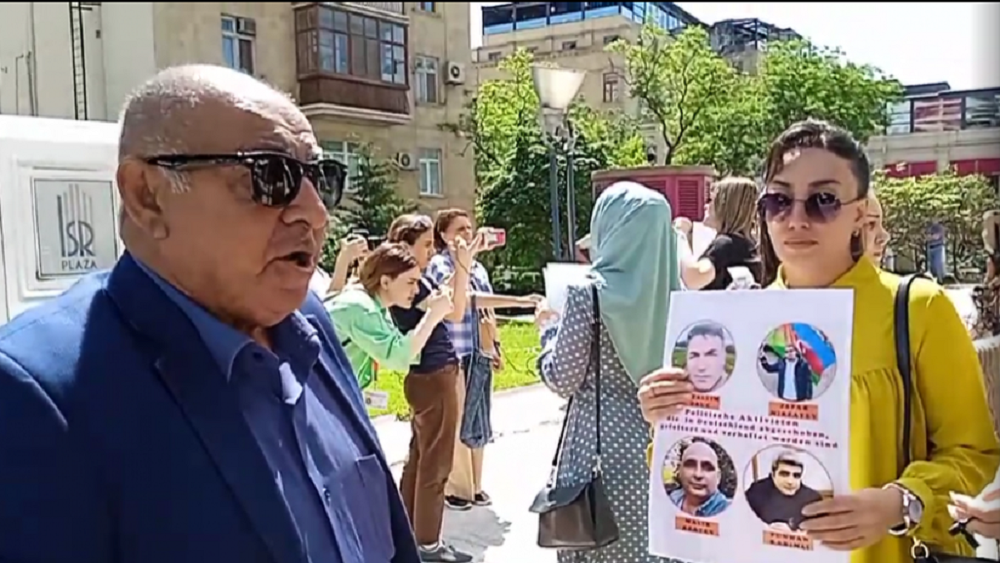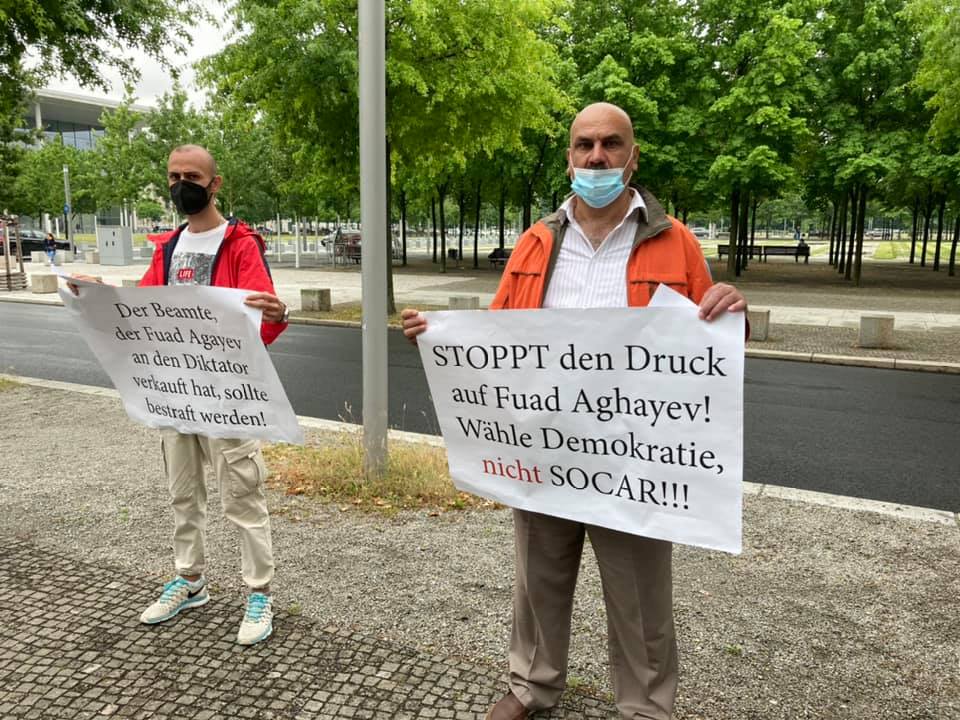Relatives of deported Azerbaijani political prisoners protest in front of German Embassy in Baku
Protest in front of the German Embassy in Baku
The German authorities are preparing to deport to Baku Azerbaijani citizens who have failed to obtain refugee status. Today, relatives and friends of the Azerbaijanis who had been arrested immediately after the deportation held a protest in front of the German embassy in Baku. They demanded that official Berlin “stop the illegal extradition” of opponents of the government to Azerbaijan.
- Political prisoner accused of illegal financing of opposition Popular Front Party released in Azerbaijan
- Azerbaijan demands ‘retraction and apology’ from UK embassy over Baku police violence comments
- Human Rights Watch calls on Azerbaijani authorities to stop attacks on freedom of speech
Not far from the airport in Düsseldorf, several Azerbaijani citizens have been placed in a special hostel for emergency deportation to Baku, local sources say. These individuals relocated to Germany in 2016-2019 in the hope of obtaining refugee status but were denied it. Their deportation to Baku is scheduled for early June.
İyunun əvvəlində Almaniyadan azərbaycanlıların növbəti deportasiyası gözlənilir.
— CAM Xəbər (@CAMXbr) May 31, 2022
Bu şəxslər artıq Düsseldorf hava limanının yaxınlığında xüsusi yataqxanaya yerləşdiriliblər.
Bildirilir ki, onlar 2016-2019-cu illərdə Almaniyaya gəlib, qaçqın statusu ala bilməyənlərdir.
Protest in Baku
According to the protesters, Azerbaijanis deported from Germany were arrested for political reasons.
“The political emigrants ended up in Germany because they fled from the regime of Ilham Aliyev. The German government illegally ‘sold’ them to Azerbaijan, and they were arrested immediately upon arrival in their homeland”, ToplumTV quoted one of the protesters.
The protesters turned out to be relatives and friends of the recently arrested Samir Ashurov, Pyunkhan Karimli, Ziya Ibrahimli, Jafar Mirzoev and some others.

Vahid Kerimov, the father of the arrested Punhan Karimli, told reporters about lawlessness during the trial of his son:
“They hide from us the time of the court session. They say that the meeting is open, but none of the relatives are allowed inside.
We applied to the German embassy with a request to monitor the trial, but no one came. We demand a fair trial, they have been slandered”.
The protesters note that this is the third appeal to the German Embassy.
The protest did not last long. The police intervened in its course, took away posters, and dispersed the participants.
Why is Germany extraditing Azerbaijani citizens?
In 2014, an agreement was signed between Azerbaijan and the European Union on the readmission (return) of illegal migrants.
According to this agreement, persons who do not meet the requirements for entry, stay and residence in the countries specified in the document are subject to extradition. The agreement implies their identification and safe return to their homeland.
According to the State Migration Service of Azerbaijan, 420 people were extradited to Azerbaijan in 2021 alone, 39 from Germany. Meanwhile, in 2021, there were 440 requests for readmission.
The number of deportees from EU countries in 2021 was 2.9% more than in 2020.
Since the entry into force of the agreement on readmission to Azerbaijan, 2,013 people have been deported from the EU countries. A request for readmission of another 4,160 people has received an affirmative answer. The deportation of 2,147 more people is expected.
Six arrests in one year
Detained on May 20 at the Baku airport immediately after returning to his homeland, Ziya Ibrahimli became the sixth political immigrant deported from Germany and arrested in Azerbaijan.
Samir Ashurov, who was deported from Germany to Azerbaijan on March 29 this year, was arrested less than a month later, in April. He is charged with stabbing a person.
Lawyer Zibeyda Sadigova told Meydan TV that her client pleaded not guilty. Ashurov said that he did not have a knife and the weapon was forcibly placed in his pocket. Samir Ashurov noted that he was arrested on political order, adding that he went on a hunger strike in protest against his illegal arrest.
Four political immigrants who were deported from Germany between June and November last year have been arrested on charges of drug possession – Mutallim Orujov, Malik Rzayev, Jafar Mirzoyev and Punkhan Karimli.
Nemat Karimli, a lawyer for PFPA activists Mutallim Orujev and Malik Rzaev, told BBC News that his clients were deported and were placed in the Olympic village in accordance with quarantine rules, and, according to them, all this time they testified to people who did not identify themselves, or who introduced themselves as employees of the migration services.
“They were shown pictures of people they met in Germany, Azerbaijani political immigrants, and asked questions about them. They were asked if they participated in political events”, Karimli said.
According to the lawyer, during the investigation, torture was used to extract confessions from his clients about drugs.



















